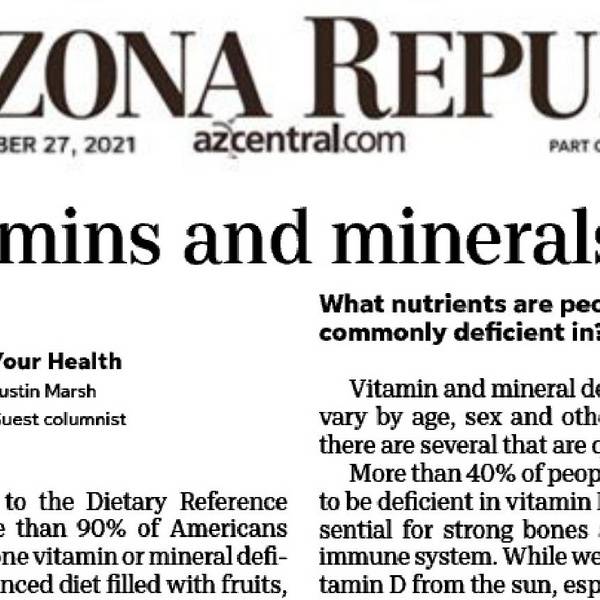
Vitamins & Minerals 101

According to the Dietary Reference Intakes, more than 90% of Americans have at least one vitamin or mineral deficiency. A balanced diet filled with fruits, vegetables, healthy fats and whole grains is the best way to obtain your vitamins and minerals, but with our busy lifestyles and processed foods, it can be difficult to get a sufficient amount through diet alone. Adding dietary supplements can help fill in the gaps and ensure your body gets enough of these essential nutrients.
Don’t know where to start with supplementing a vitamin or mineral deficiency? Read on for some answers to commonly asked questions.
What is the difference between vitamins and minerals?
Commonly grouped together, vitamins and minerals are both micronutrients—they’re only needed in small amounts but are vital to maintaining optimal health. Vitamins are organic compounds made from animals and plants. They can be broken down when exposed to heat, air, acid or light (so storing them properly is imperative). Minerals are inorganic compounds that can’t be broken down. They come from water and soil. You can utilize dietary supplements to increase your intake of both of these important nutrients.
How do I know if I have a nutrient deficiency?
It is important to be aware of the common symptoms associated with a nutrient deficiency. Brittle nails, hair loss, muscle pain, issues with your eyesight, fatigue, irritability and anxiety are all indicators that you should pay attention to.
Before starting a new supplement routine, always consult with your healthcare provider. They may run blood work to determine your vitamin and mineral levels and establish the correct supplementation dosages to meet your needs. Having too much of a vitamin or mineral can also be harmful.
What nutrients are people commonly deficient in?
Vitamin and mineral deficiencies can vary by age, sex and other factors, but there are several that are quite common.
More than 40% of people are believed to be deficient in vitamin D, which is essential for strong bones and a healthy immune system. While we can obtain vitamin D from the sun, especially in sunny Arizona, we still aren’t getting enough of this important vitamin because of how much time we spend indoors.
Iron is a key mineral that many people are deficient in, especially women, children and those who consume a vegan diet. Low levels of iron can cause anemia, a condition in which the blood has a shortage of oxygen-carrying red blood cells.
Magnesium is an extremely vital mineral that plays a crucial role in many functions in the body including mental health, digestion, sleep, heart health, muscle and nerve function and more; yet half of all Americans don’t meet their estimated daily requirement.
B vitamins impact energy levels and cell health, but many people are deficient in them—especially vitamin B12 which aids in the production of DNA, nerves and blood cells; vitamin B6 which supports brain development and immune function; and vitamin B1 which produces energy and protects cells against free radicals.
What should I look for when choosing a supplement?
With so many options to choose from, it can be overwhelming to select the right supplement for your new routine. First, you’ll want to verify that the supplement company has Good Manufacturing Practice (GMP) certifications; these are strict requirements established by the FDA to certify safe, accurately labeled products.
Before purchasing, do some quick research on the product. Find out which clinical studies were utilized to determine an ingredient’s inclusion in the formula. Were any additional tests performed on the product that demonstrate safety and efficacy? A nutritional supplement should have statistics that support every claim a company makes for it.
The label should also specify that the product is non-GMO and free of any allergens you may be sensitive to like dairy, gluten or soy. You’ll also want to check the ‘other ingredients’ on the label to make sure there are no unnecessary binders, fillers or other unwanted additives like artificial flavors or colors.
Now that you know the vitamin and mineral basics, work on incorporating the nutrients you may be lacking into your supplement routine. You’ll soon see improvement in your long-term health and overall well-being.
Justin Marsh is the CEO of Arthur Andrew Medical, a Scottsdale-based manufacturer of enzyme and probiotic based dietary supplements. Arthur Andrew Medical’s products are rooted in science with no processing agents or fillers. They are dedicated to conducting extensive research and clinical applications with dietary supplements for the advancement of natural health alternatives.